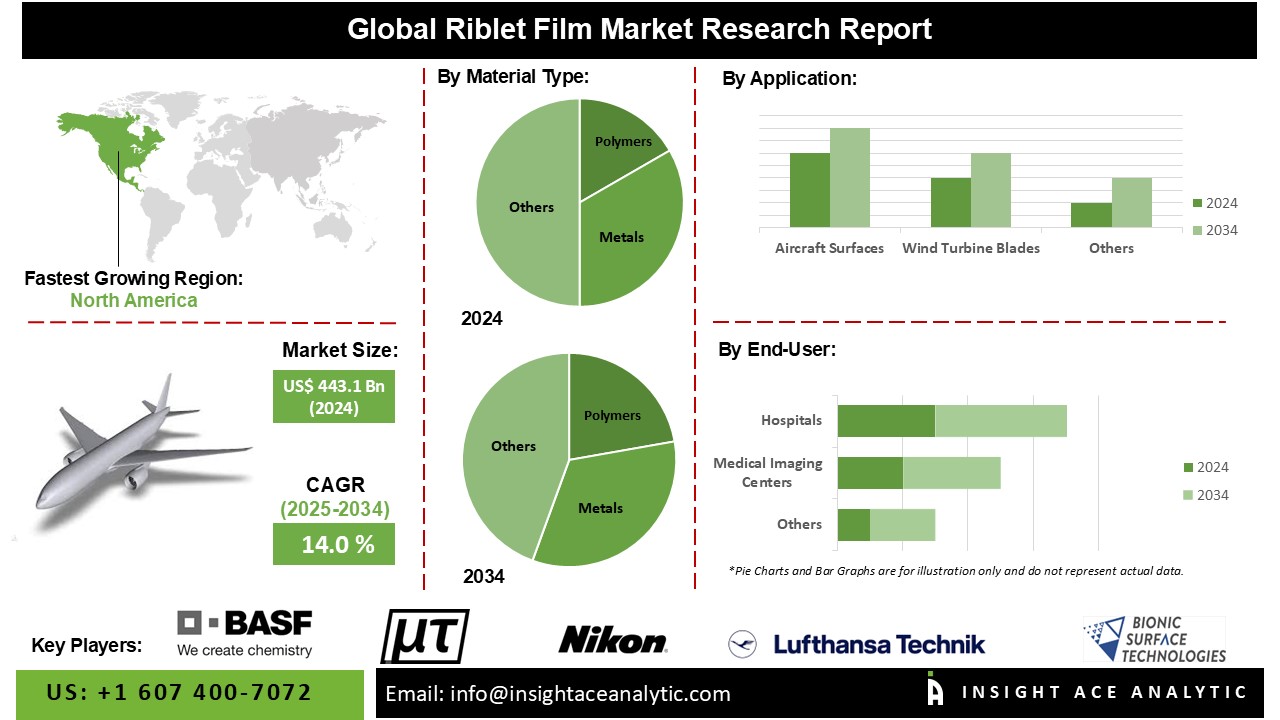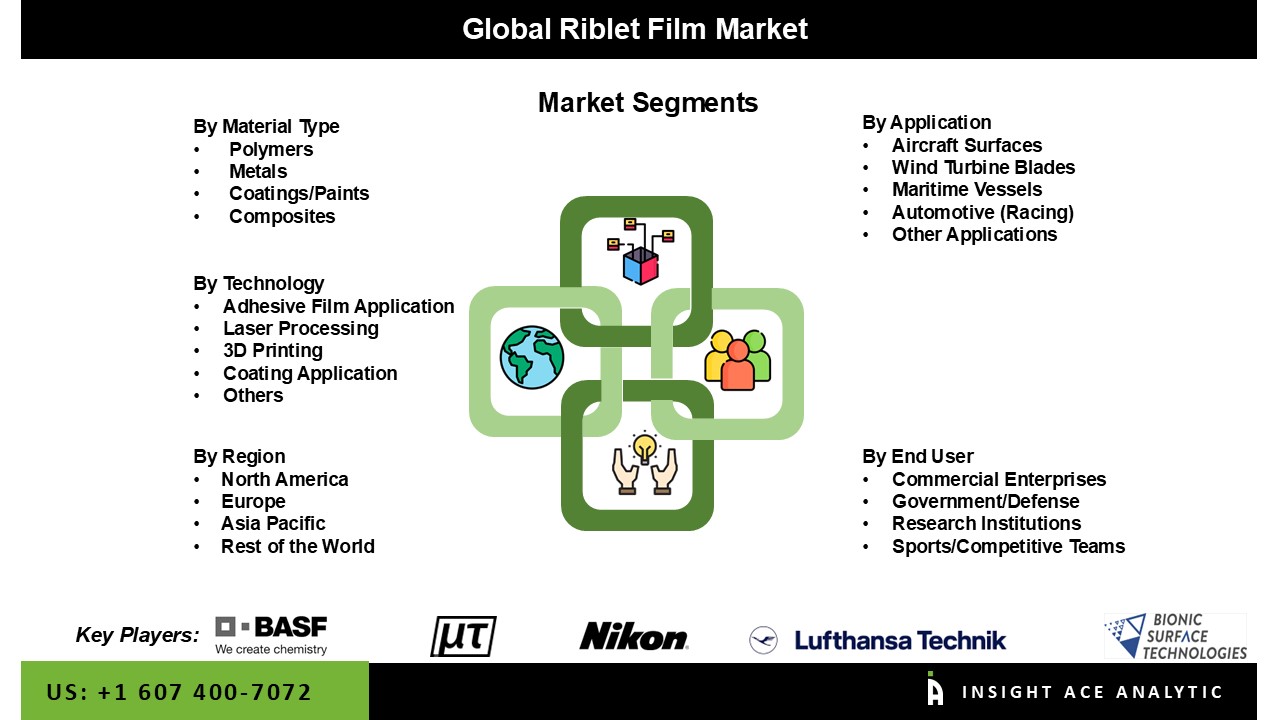Riblet Film Market Size is valued at USD 443.1 million in 2024 and is predicted to reach USD 1,593.6 million by the year 2034 at an 14.0% CAGR during the forecast period for 2025-2034.

Riblets are a class of biomimetic devices with an artificially created pattern structure resembling shark skin. Riblet film can be used directly on various materials, including metals, resins, and coatings, expanding its range of uses to high-temperature settings.
Furthermore, riblet provides accuracy and flexibility for application on three-dimensional curved surfaces while dispelling any wrinkle-related worries. The riblet film market revenue growth is being fueled by the quick uptake of riblet films due to their advantages in a variety of applications, including race cars, windmills, gas turbines, drones, propeller-driven aircraft, pumps, and others.
In addition, the use of riblet films in wind tunnels results in significant drag reduction and low wall shear stress because the riblet dimensions adapt to the aircraft boundary layers. These factors are anticipated to fuel market revenue growth.
Over half of an aircraft's drag is caused by skin friction, and reducing this drag would significantly improve aerodynamic performance while also reducing fuel consumption. According to study, when half of the surface is covered with effective riblets, a subsonic jet transport with skin friction drag of roughly 45% at cruising conditions is predicted to deliver 8% skin friction savings, accounting for close to 4% of total cost savings. These elements collectively fuel market expansion.
The riblet film market is segmented into the material type, application, end-user and technology. The riblet film market is categorized by Material Type (Polymers, Metals, Coatings/Paints, Composites). The application segment comprises Aircraft Surfaces, Wind Turbine Blades, Maritime Vessels, Automotive (Racing), Other Application. Whereas, End User segment includes Commercial Enterprises, Government/Defense, Research Institutions, and Sports/Competitive Teams. At last, the technology segment consists of Adhesive Film Application, Laser Processing, 3D Printing, Coating Application, Others.
North America overtook other regional markets as the largest market for riblet film, with the highest revenue share due to the region's fast adoption of new technologies and increased demand for riblet film from the aerospace and defence industries. The market in North America is experiencing revenue growth due to rising environmental awareness and fuel efficiency. Besides, the market for riblet film in Europe is predicted to grow at the fastest CAGR. The expanding high-value investments in R&D made by Europe, one of the world's largest automakers, are the main drivers of the segment's revenue growth. The European aerospace market is anticipated to rise in revenue as a result of the European Commission's support for the sector's efforts to lower the carbon footprint of aircraft and create zero-emission aircraft based on cutting-edge technologies.
| Report Attribute | Specifications |
| Market size value in 2024 | USD 443.1 million |
| Revenue forecast in 2034 | USD 1,593.6 million |
| Growth rate CAGR | CAGR of 14.0% from 2025 to 2034 |
| Quantitative units | Representation of revenue in US$ Mn, and CAGR from 2025 to 2034 |
| Historic Year | 2021 to 2024 |
| Forecast Year | 2025-2034 |
| Report coverage | The forecast of revenue, the position of the company, the competitive market statistics, growth prospects, and trends |
| Segments covered | Type, Application, Technology And End User |
| Regional scope | North America; Europe; Asia Pacific; Latin America; Middle East & Africa |
| Country scope | U.S.; Canada; U.K.; Germany; China; India; Japan; Brazil; Mexico; France; Italy; Spain; South Korea; Southeast Asia |
| Competitive Landscape | Micro Tau, Bionic Surface Technologies GmbH, BASF, Lufthansa Technik and Nikon Corporation. |
| Customization scope | Free customization report with the procurement of the report, Modifications to the regional and segment scope. Particular Geographic competitive landscape. |
| Pricing and available payment methods | Explore pricing alternatives that are customized to your particular study requirements. |
Riblet Film Market By Material Type

Riblet Film Market By Application
Riblet Film Market By End user
Riblet Film Market BY Technology
Riblet Film Market By Region-
North America-
Europe-
Asia-Pacific-
Latin America-
Middle East & Africa-
This study employed a multi-step, mixed-method research approach that integrates:
This approach ensures a balanced and validated understanding of both macro- and micro-level market factors influencing the market.
Secondary research for this study involved the collection, review, and analysis of publicly available and paid data sources to build the initial fact base, understand historical market behaviour, identify data gaps, and refine the hypotheses for primary research.
Secondary data for the market study was gathered from multiple credible sources, including:
These sources were used to compile historical data, market volumes/prices, industry trends, technological developments, and competitive insights.

Primary research was conducted to validate secondary data, understand real-time market dynamics, capture price points and adoption trends, and verify the assumptions used in the market modelling.
Primary interviews for this study involved:
Interviews were conducted via:
Primary insights were incorporated into demand modelling, pricing analysis, technology evaluation, and market share estimation.
All collected data were processed and normalized to ensure consistency and comparability across regions and time frames.
The data validation process included:
This ensured that the dataset used for modelling was clean, robust, and reliable.
The bottom-up approach involved aggregating segment-level data, such as:
This method was primarily used when detailed micro-level market data were available.

The top-down approach used macro-level indicators:
This approach was used for segments where granular data were limited or inconsistent.
To ensure accuracy, a triangulated hybrid model was used. This included:
This multi-angle validation yielded the final market size.
Market forecasts were developed using a combination of time-series modelling, adoption curve analysis, and driver-based forecasting tools.
Given inherent uncertainties, three scenarios were constructed:
Sensitivity testing was conducted on key variables, including pricing, demand elasticity, and regional adoption.